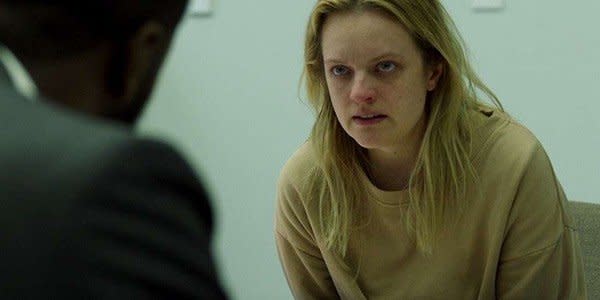How 'Invisible Man' rebooted a classic horror story for the #MeToo era
Leigh Whannell didn’t set out to tell a story about domestic violence with The Invisible Man, February’s critically acclaimed horror reboot that was one of the few box-office success stories to hit theaters before the industry faced a nationwide coronavirus-fueled shutdown.
But there’s a clear post-#MeToo subtext that lurks throughout the shadows of the film, which puts a fresh and topical twist on Universal’s classic movie monster. Elisabeth Moss stars a woman who escapes her abusive, domineering tech-magnate husband (Oliver Jackson-Cohen); after his death, he returns, seemingly undetectable, to terrorize her.
“I think that was something that emerged organically through the writing of the script,” Whannell (Saw, Insidious) told us (watch above). “I started with the character — this great character that’s so iconic. And I started building back from there. Like, OK, he’s scarier if he’s in the background and we don’t know him too well. So that makes the story about his victim. Who’s the victim? It’s a woman. And pretty soon I unraveled that she was escaping this toxic relationship. And when you do your research into that stuff, as I did, you find out how scary and how prevalent it is.”

Of course in this story, no one is going to believe a woman who claims she’s being haunted by an invisible man.
“The idea of a woman not being believed obviously is very relevant right now,” Moss (Handmaid's Tale) tells says about the film’s allegorical messages, which unfold in concert with its scares. Just three days before the film’s release, disgraced film executive Harvey Weinstein was convicted of rape and a criminal sexual act in one of the most notable developments yet in the #MeToo era, while accusations still linger against various other high-profile media and entertainment figures as well as the president of the United States.

In his research, Whannell visited domestic violence shelters and heard stories from counselors about women whose partners sealed their refrigerators with a safe lock. “The amount of control is pathological,“ he says.
“And we witness this behavior all the time,” says Jackson-Cohen. “So if it can do something, this movie, apart from scare people, it’s hopefully to kind of get that message across.”
Adds Moss: “We really tried to be inclusive of different kinds of abuse. ... Not just physical abuse but emotional abuse, psychological abuse, gaslighting, bullying. That there are different kinds of toxic relationships that can be incredibly damaging to people.”
One year ago this month Moss co-starred in Us — another horror movie with plenty on its mind, from Get Out writer-director Jordan Peele. She sees a pattern developing with The Invisible Man.
“I think the idea of putting a woman at the center of it, turning the Invisible Man the monster into a real monster, into an abusive relationship, into gaslighting, all of that, the way that Leigh constructed that and still made it scary and entertaining all of that with this deeper underlying thing,” she says. “It’s where this genre’s going, I think.”
Stream or buy The Invisible Man on Amazon.
Watch Elisabeth Moss talk about filming scenes with an unseen assailant:
Read more on Yahoo Entertainment:

